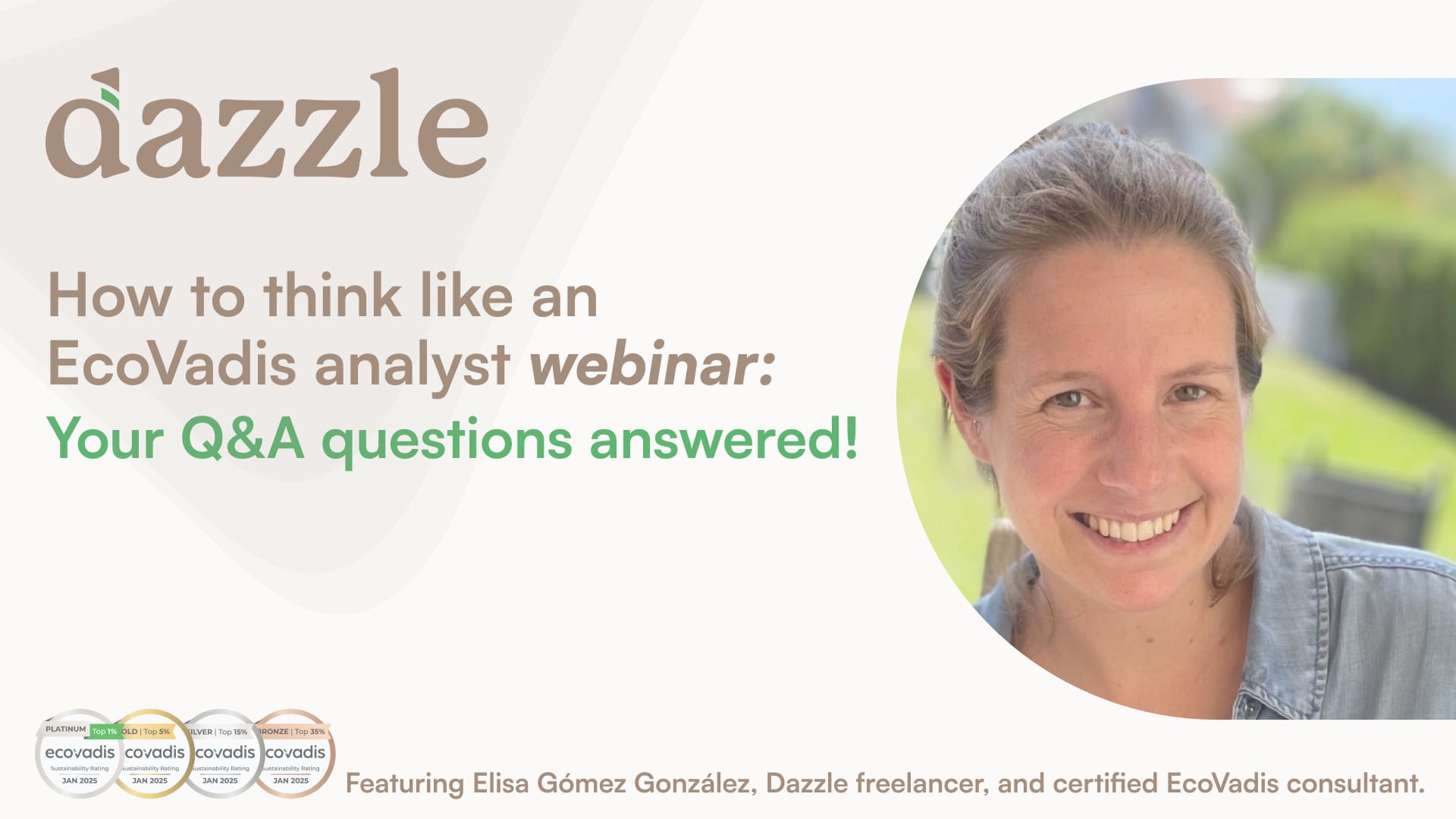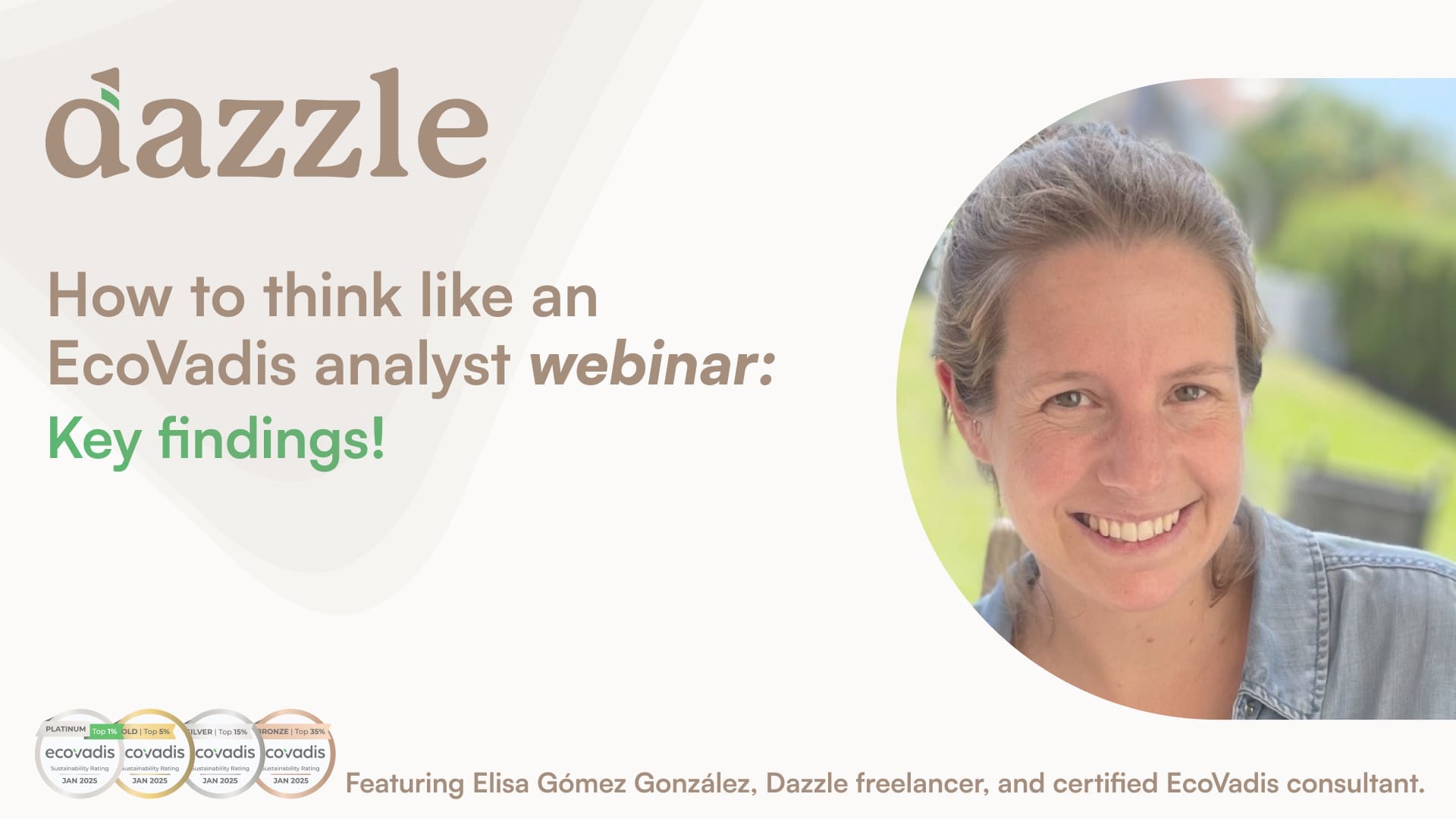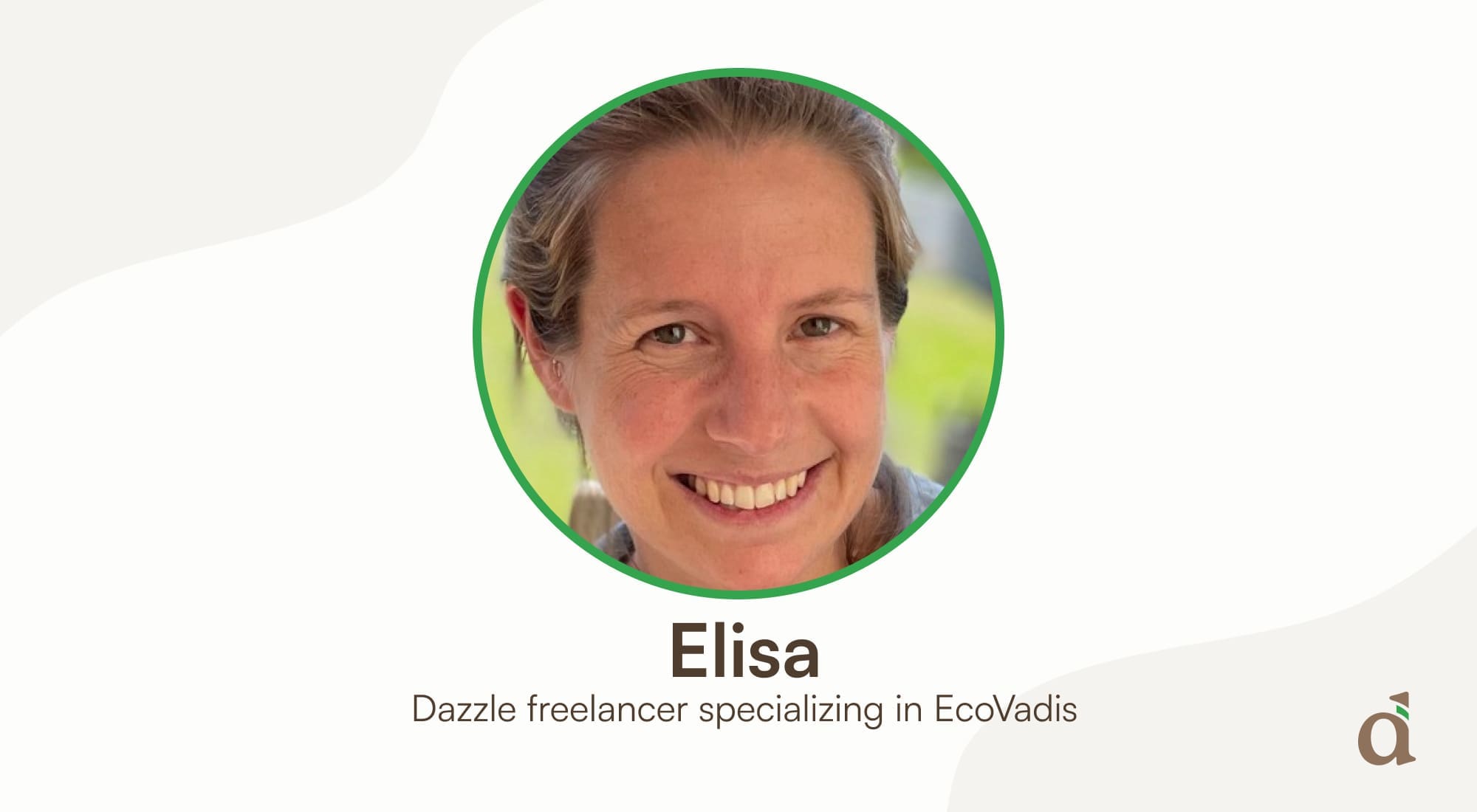As you’re probably well aware, achieving a strong EcoVadis score requires more than simply submitting policies and reports. Companies often struggle with understanding what evidence matters, how materiality affects their assessment, or how to organize documentation across departments. And without this clarity, even the most well-intentioned sustainability efforts can go underappreciated in the scoring process.
That’s why we hosted our recent webinar with certified EcoVadis consultant and Dazzle freelancer, Elisa Gómez González: to provide the clarity that’s required to maximize your EcoVadis score. This was the fourth edition of our Making Sustainability Work webinar series, and as always, during the webinar, attendees were able to ask questions in the chat section throughout.
In this blog, we’ve collected those questions, and Elisa has provided the answers! Organized below into sub-categories for your convenience!
So whether you’re preparing for your first assessment or looking to improve your next score, we hope Elisa’s answers will help you approach EcoVadis with confidence.
You asked, we answered: Insights from our recent EcoVadis Q&A
Understanding the questionnaire and customization

Q: Are the criteria for customizing questionnaires by country/industry/materiality transparent?
A: EcoVadis provides information on sectors, company sizes, and locations on its website, but it does not publish detailed customization-specific criteria. You can see the specific criteria applied to your company in your EcoVadis portal under your account.
Q: Where can you check if the correct questionnaire has been assigned to your company?
A: In your portal under ‘company information’, you can see the sector size and areas of operation you have been placed in. Normally, when you register your company, you will need to populate this.
Q: For global companies in the same sector, do all entities receive the same questionnaire? Does the headquarters location matter?
A: Global companies in the same sector will start off with the same questionnaire and activated topics, but your total number of employees and areas of operation will affect the number of questions and the scoring weight.
Q: Is it possible to download the EcoVadis questionnaire even if your company is not ready to submit it yet?
A: You can register and see the questionnaire, you will only need to pay once you submit.
Materiality and sector-specific criteria

Q: EcoVadis uses its own materiality criteria. Are these shared openly so companies can compare them with CSRD requirements? (Where do we check which topics are activated criteria for our industry?)
A: Yes, they’re available in the sector industry report. In the Performance tab, under your company name, you’ll find your company size and a hyperlink to your sector. Click there and you will find what is activated.
Q: Why can some companies deactivate topics that aren’t material according to their DMA, while others cannot?
A: EcoVadis is currently updating its methodology, so the option to deactivate non-material topics isn’t yet fully available or formalized. In the meantime, I highly recommend you check your industry-activated criteria. (In the Performance tab, under your company name, you’ll find your company size and a hyperlink to your sector). If a topic is activated for your sector, you should still report on it, even if it’s not material according to your DMA. Place in the comment section of the question that it is not material to you, and upload whatever supporting evidence you have. It is still not confirmed whether EcoVadis will not score something that’s not material to you, so for now, the activated criteria in your sector is what counts.
Q: How do you focus on high-impact topics for a first-time assessment?
A: You need to register first, and once you have a profile in Ecovadis, you will have access to the industry-activated criteria and your questionnaire.
Documentation and evidence

Q: Do brand-new policies need to be at least two months old to count? Does this also apply to first-time submissions from newer companies?
A: Under previous EcoVadis rules, new policies had to be in place at least two months before the assessment. However, according to the 2025 EcoVadis Document Guide, this rule has been removed. While there’s no longer a formal minimum timeframe, it’s still best practice to have new policies established at least a month before submission. But according to the published material there is no set rule on it, so they should accept a policy created right before the assessment. More info on this here.
Q: Are policies accepted if their targets have expired, but updated ones are included in the sustainability report?
A: You need to be coherent here. If the policy targets have expired, then delete them from the policy. But you cannot have two documents with different targets in them.
Q: What type of evidence is needed for KPIs that show 100% coverage?
A: For coverage, you need to present some proof of certificates (if it’s ISO certificate coverage), or risk assessments depending on the coverage KPI.
Q: We let external companies audit suppliers for labour and human rights issues. How can we include these audits as proof under sustainable procurement if our logo isn’t on them? (Q: If the document is from my supplier, how do I add my logo?)
A: You need to upload the procedure where you detail how you do this. Then upload an Excel file with the track record showing each supplier and whether the audit was completed. And include at least one audit report as proof, ensuring it clearly shows the supplier name and audit date as reflected in your tracker.
Q: Can we use the question number as a reference while naming supporting documents?
A: You can name the document as you wish. As for page number, each time you attach a document, I highly recommend indicating the full document length — for example, pages 1–55 — each time you attach a file.
Q: If my annual report has been verified by an external party, is that enough, or should I add reports or other documents to underscore the reliability of the information?
A: You should include the certificate or official statement from the external party confirming they have verified the information. Normally, the verification section at the end of your report is sufficient.
Q: For newer companies, how does the reporting section work if we don’t have 3 years of data? Will we be scored down for this?
A: For new companies, just place the data you have. EcoVadis will take into account that your company is new and note your start date.
Q: What is the difference between answering “I don’t know” and “No” when in doubt (e.g., REACH, RoHS, or Conflict Minerals)?
A: I highly recommend that you verify internally whether or not it is a “No”, and do not place “I don´t know” as your answer. There is no clear indication of scoring for these two, but it is never good to answer with “I don´t know”.
Q: Is all auditing internal, or are third-party audits also considered?
A: Both internal and external audits are required and contribute to the score.
Q: Is there a list of certified sources for EcoVadis 360?
A: You can find all published information on EcoVadis 360 here.
Q: Why do the question codes change depending on the company? For example, if our sector changes, the codes applied previously change. Is this due to sector, size, scope, or a combination?
A: The codes change because they have changed the components of the question, maybe added some aspects, or reworded some sections. So do ensure you attach any past documentation again if relevant.
Q: My company has all policies in the company policy suite. Can we also create an ESG training log and refer to relevant pages to demonstrate code of conduct trainings, information security trainings, etc.?
A: The policies need to be uploaded as a document, even if they are in the suite. For trainings, it’s good to create a training log, where you have a record of the training, the date when it was given, and the total employees who attended etc.
Scoring and measures

Q: You mentioned that the score is not comparable, as criteria might differ due to sector, size, and location — but how does EcoVadis then rate the medals? From my understanding, the percentile is related to all companies rated.
A: Yes, the percentile is calculated relative to all companies rated, even if questionnaire length, company size, or sector differ.
Q: This question is about measures: For example, in the Ethics section, they mention 4+ measures. Is this per key issue (so 8 in total), or in total for that section? Same question for Environment and other sections.
A: You need four measures for each activated topic. So for instance, in Environment, if energy & emissions, waste, and customer health & safety are activated, you need 4 measures for each topic.
Q: Must the targets in the policy align with SBTi?
A: If you have SBTi, then yes. If you don´t have SBTi, you can set your own targets.
Q: How can a company prepare for the ratings all year round? How do we get prepared in advance, to have all answers and documentation ready?
A: Once you receive the results, do an analysis of the improvements identified and the gaps found. Give clear responsibilities to all departments involved, select key documents to update annually (KPIs and reports), and if you want to really make sure you’re always prepared, engage an expert to provide ongoing guidance throughout the year.
Special cases

Q: Is it better to do one assessment for your entire company, or to do one for each country in which your company operates?
A: I recommend a single assessment for the entire company, as it’s simpler and more cost-effective. But it depends on why you need EcoVadis. If a client requests an EcoVadis assessment and accepts a group account, a single submission for the entire company works well. However, if a client requires assessment of a specific entity, you will need to submit separately for that entity. Similarly, if all your companies operate within the same sector, a group submission makes sense, but if the entities span different sectors, it’s better to submit individually.
Q: Is there a category for community organisations like us? We have limited financial and human resources, so I’m wondering if there is another certification that might suit us better.
A: EcoVadis assessments are only available for companies; NGOs and community organisations cannot be assessed.
Making EcoVadis work for your company

We know very well that navigating EcoVadis can feel daunting, and we hope Elisa’s answers above can help to ease the pressure a little, and make the process more clear.
But as Elisa mentioned in one of her answers, the best way to ensure that you’re always prepared, and to maximize your score, is to engage an expert to provide ongoing guidance throughout the year.
Elisa — among other Dazzle freelancers who are also certified EcoVadis consultants — can provide you with just that kind of guidance.
If you feel it would be a big help for you, feel free to contact us today, and we can connect you with the help you need within 48 hours.





